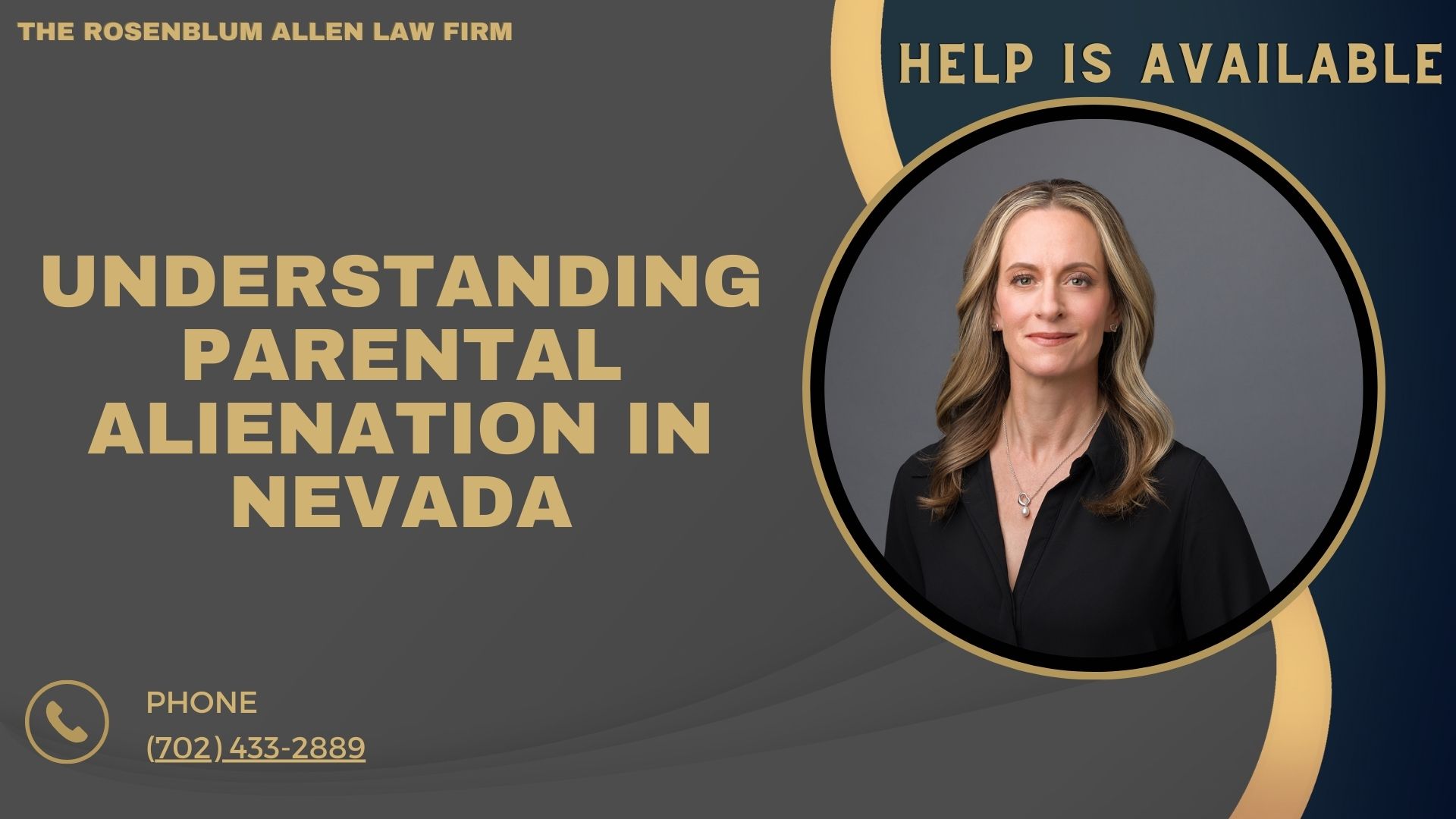Parental alienation is a complex and often heart-wrenching issue that affects many families in Nevada. Understanding this phenomenon is crucial whether you’re a parent, legal professional, or concerned family member. Let’s explore the issue of parental alienation in Nevada and its implications in the Silver State.
Understanding Parental Alienation in Nevada
Imagine a child suddenly refusing to see one parent and spouting criticisms that sound oddly adult-like. This scenario might be more than just typical family drama—it could be parental alienation.
Definition and Characteristics
Parental alienation in Nevada occurs when one parent manipulates a child to reject or fear the other parent without justification. It’s like a magic trick gone wrong, where one parent makes the other disappear from the child’s life.
Behaviors associated with parental alienation in Nevada
- Badmouthing the other parent
- Limiting contact with the other parent
- Erasing the other parent from family narratives
- Forcing the child to choose sides
- Sharing inappropriate information about the other parent or the divorce
Impact on children and family dynamics
The effects of parental alienation can be devastating. Children caught in the crossfire often experience:
- Anxiety and depression
- Low self-esteem
- Difficulty forming healthy relationships
- Academic struggles
- Substance abuse issues
For years, families may face ongoing conflict, legal battles, and emotional turmoil.
Recognition in Nevada Family Law
Nevada’s legal system is increasingly aware of parental alienation in Nevada and its consequences. But how does it play out in the courtroom?

Legal Framework Addressing Parental Alienation
While Nevada doesn’t have specific laws mentioning “parental alienation,” courts consider it under the broader umbrella of the child’s best interests. Judges look at parental alienation as a form of emotional abuse that can significantly impact custody decisions.
Relevant Nevada statutes and case law
Nevada Revised Statutes (NRS) 125C.0035 outlines factors courts consider in determining custody. While parental alienation isn’t explicitly mentioned, several factors relate to it:
- The ability of the parent to cooperate and meet the child’s needs
- The mental and physical health of the parents
- The child’s relationship with each parent
In recent years, Nevada courts have shown a willingness to consider parental alienation in custody cases. For example, in the 2019 case of Harrison v. Harrison, the court modified custody after finding evidence of alienating behaviors.
Identifying Parental Alienation in Nevada
Spotting parental alienation can be tricky. It’s not always as apparent as a neon sign in the Las Vegas strip. Let’s explore the signs and how to differentiate it from other family issues.
Common Signs and Symptoms
Behavioral changes in children
Keep an eye out for these red flags:
- Sudden hostility towards one parent
- Parroting adult language or concerns
- Refusing visitation without clear reasons
- Extending negativity to the targeted parent’s family
Patterns of alienating behavior in parents
Alienating parents might:
- Constantly badmouth the other parent
- Interfere with communication and visitation
- Reward the child for rejecting the other parent
- Make the child feel guilty for showing affection to the other parent

Differentiating from Other Family Issues
Not every family conflict is parental alienation. It’s crucial to distinguish it from other dynamics.
Overlap with other family dynamics.
Parental alienation can sometimes overlap with or be mistaken for:
- Typical developmental phases (e.g., teenagers seeking independence)
- Adjustment difficulties following divorce
- Loyalty conflicts in high-conflict divorces
Understanding these nuances is crucial for Nevada families and legal professionals navigating these turbulent waters. Remember, each family’s situation is unique, and professional guidance is often necessary to accurately identify and address parental alienation.
Legal Implications in Nevada Courts
When parental alienation enters the courtroom, it’s like opening Pandora’s box. Let’s explore how Nevada courts handle this complex issue.
Custody and Visitation Considerations
Parental alienation can turn custody battles into high-stakes poker games. Here’s how it plays out in Silver State courtrooms:
Impact on custody determinations
Nevada judges take parental alienation seriously. They view it as a form of emotional abuse that can harm the child’s well-being. When proven, it can significantly influence custody decisions.
Consider this scenario:
Mom has been badmouthing Dad to their 10-year-old son. The son now refuses to visit Dad. If the court finds evidence of alienation, they might:
- Award Dad more parenting time
- Order supervised visits for Mom
- Require Mom to attend parenting classes
Modifications to existing custody arrangements
Parental alienation doesn’t just affect initial custody decisions. It can also be grounds for modifying existing arrangements.
For example:
When Dad discovers that Mom has been telling their teenage daughter that he doesn’t love her, he can petition the court to modify the custody order, potentially gaining more time with his daughter.
Evidence and Documentation
Proving parental alienation isn’t like proving 2+2=4. It requires solid evidence and effective opinions.

Types of evidence accepted in Nevada courts
Nevada courts consider various forms of evidence in parental alienation cases:
- Text messages and emails showing alienating behavior
- Voicemails or recordings of the alienating parent
- Testimony from witnesses (family members, teachers, therapists)
- Records of missed visitations or violated court orders
- Social media posts demonstrating alienating behavior
Pro tip: Keep a detailed journal of incidents. It can be a goldmine of evidence.
Importance of professional evaluations
Opinions carry significant weight in Nevada courts. Here’s who might be called to testify:
- Child psychologists
- Custody evaluators
- Parenting coordinators
- Guardian ad litems (attorneys appointed to represent the child’s interests)
These professionals can provide crucial insights into the family dynamics and the child’s well-being.
Addressing Parental Alienation in Nevada
Once parental alienation is identified, what can be done? Let’s explore Nevada’s tools for tackling this issue.
Legal Remedies and Interventions
Nevada courts have several tricks up their sleeve to address parental alienation.
Court-ordered therapy and counseling
Judges often prescribe therapy as a first step. This might include:
- Individual therapy for the child
- Family therapy sessions
- Reunification therapy to rebuild the damaged parent-child relationship
Think of it as relationship rehab, court-style.
Custody modifications and enforcement
When therapy isn’t enough, courts may take more drastic measures:
- Modifying custody arrangements
- Enforcing visitation orders with penalties for non-compliance
- In extreme cases, transferring primary custody to the alienated parent
Remember: The court’s primary concern is always the child’s best interests.
Support and Resources
Dealing with parental alienation can feel like navigating a maze blindfolded. Luckily, Nevada offers several support systems.
Professional services available in Nevada
- Family law attorneys specializing in high-conflict cases
- Mediators trained in parental alienation
- Parenting coordinators to help manage co-parenting conflicts
- Child psychologists experienced in alienation cases
Support groups and educational programs
- Parental alienation support groups in Las Vegas and Reno
- Co-parenting classes (often court-mandated)
- Online forums and resources for affected families
Remember, you’re not alone in this journey. Reach out and connect with others who understand what you’re going through.

Prevention and Mitigation Strategies
An ounce of prevention is worth a pound of cure, especially when it comes to parental alienation. Let’s explore some strategies to keep your family bonds strong and healthy.
Co-Parenting Techniques
Effective co-parenting is like a well-choreographed dance. It takes practice, patience, and a willingness to work together.
Effective communication strategies
Good communication is the foundation of successful co-parenting. Here are some tips:
- Use a business-like tone in all interactions
- Stick to child-related topics
- Avoid blame and focus on solutions
- Consider using co-parenting apps to keep communication organized
Remember, you’re not trying to win an argument. You’re trying to raise happy, healthy kids.
Maintaining healthy parent-child relationships
Here’s how to keep your relationship with your child strong:
- Show interest in your child’s life
- Create new traditions and rituals
- Be consistent and reliable
- Never speak negatively about the other parent
Think of your relationship with your child as a garden. It needs regular care and attention to flourish.
Professional Intervention
Sometimes, you need a pro to help you navigate the choppy waters of co-parenting.
Role of mental health professionals
Mental health professionals can be your secret weapon against parental alienation. They can:
- Provide individual therapy for children and parents
- Offer family therapy to improve communication
- Help children process their feelings about the divorce
- Teach coping strategies for dealing with high-conflict situations
Mediation and conflict resolution services
Mediation is like having a referee in a heated game. It can help:
- Resolve disputes without going to court
- Improve communication between parents
- Create workable parenting plans
- Address issues before they escalate to alienation
Challenges and Controversies
Parental alienation isn’t without its share of debates and disagreements. Let’s dive into some of the hot topics.

Debates in the Legal and Mental Health Communities
The topic of parental alienation can spark more heated debates than a Vegas poker game.
Criticisms of parental alienation theory
Some professionals argue that:
- The concept is not scientifically valid
- It’s often used to dismiss legitimate abuse claims
- It oversimplifies complex family dynamics
Others counter that:
- Parental alienation is a natural and harmful phenomenon
- It can cause long-lasting psychological damage to children
- Courts need to take it seriously to protect children’s well-being
Evolving perspectives in Nevada courts
Nevada courts are like a living organism, constantly adapting to new information. Here’s how their approach is evolving:
- Increased recognition of parental alienation as a form of emotional abuse
- More emphasis on early intervention and prevention
- Greater use of mental health professionals in evaluating cases
Balancing Child Welfare and Parental Rights
This is the tightrope that Nevada courts must walk.
Best interests of the child standard in Nevada
The child’s best interests in Nevada are the North Star guiding all custody decisions. This includes:
- The child’s physical and emotional needs
- The level of conflict between the parents
- Each parent’s ability to encourage a relationship with the other parent
Protecting children while preserving family bonds
It’s a delicate balance. Courts aim to:
- Shield children from harmful, alienating behaviors
- Maintain relationships with both parents when safe and appropriate
- Provide interventions that heal family relationships
Remember, there’s no one-size-fits-all solution. Each family’s situation is unique, like a fingerprint.
Future Outlook and Trends
As we gaze into our crystal ball, what does the future hold for parental alienation cases in Nevada? Let’s explore the emerging trends and potential changes on the horizon.
Evolving Legal Landscape in Nevada
The legal world is constantly in motion, like the ever-spinning roulette wheels of Las Vegas. Here’s what we might see in the coming years:
Potential legislative changes
Nevada lawmakers are keeping their eyes on parental alienation. We might see:
- Specific laws addressing parental alienation
- Mandatory training for judges on recognizing alienation
- Stricter penalties for parents who engage in alienating behaviors
Imagine a future where alienation is as clearly defined in law as other forms of abuse. It’s not here yet, but it’s on the radar.
Emerging case law and precedents
Court decisions are like building blocks, each one shaping future cases. Recent trends include:
- More weight given to effective testimony on alienation
- Increased use of reunification therapy in court orders
- Consideration of alienation in relocation cases
For example, in a recent Nevada case, a judge ordered a parent to pay for their child’s therapy after finding evidence of alienation. This decision could influence future rulings.

Advancements in Treatment and Intervention
Just as Vegas is constantly unveiling new attractions, the mental health field is continually developing new approaches to tackle parental alienation.
New approaches to family therapy
Therapists are getting creative in their treatment methods. Some emerging techniques include:
- Virtual reality therapy to simulate positive family interactions
- Mindfulness-based interventions for alienated children
- Intensive “boot camp” style family reunification programs
These new approaches aim to repair family bonds faster and more effectively than traditional therapy.
Technological tools for monitoring and prevention
Technology is joining the fight against parental alienation. Here are some innovations on the horizon:
- AI-powered apps to detect early signs of alienation in communication
- Virtual co-parenting coaches using machine learning
- Blockchain-based systems for tamper-proof documentation of parenting time
Imagine an app gently reminding you to use positive language when messaging your co-parent. The future of co-parenting might be in your pocket!
As we wrap up our journey through the world of parental alienation in Nevada, remember that knowledge is power. Whether you’re a parent navigating these choppy waters, a legal professional seeking to understand the landscape, or a concerned family member, staying informed is your best defense.

Breaking It All Down
The future of parental alienation cases in Nevada is likely to involve technological innovation, evolving legal perspectives, and cutting-edge therapeutic approaches.
As the Silver State continues to refine its approach to this complex issue, families caught in the crossfire of alienation can hope for more effective, tailored solutions.
Remember, no matter how difficult things seem, there’s always hope for healing and reconciliation. Like Nevada’s resilient spirit, families can overcome the challenges of parental alienation and forge stronger bonds in the process.

Frequently Asked Questions
How long does it typically take for parental alienation to develop?
Parental alienation can develop over varying periods, from a few months to several years. The process often intensifies during high-conflict divorces or custody battles.
Can parental alienation occur unintentionally?
Yes, parental alienation can sometimes occur unintentionally. A parent’s anxiety, stress, or unresolved emotions about the separation may inadvertently influence the child’s perception of the other parent.
Are there any long-term effects of parental alienation on children in adulthood?
Adults who experience parental alienation as children may struggle with trust issues have difficulty forming healthy relationships, and experience increased rates of anxiety and depression.
Can grandparents or other family members contribute to parental alienation?
Yes, extended family members can contribute to parental alienation by reinforcing negative messages about the targeted parent or interfering with the child’s relationship with that parent.
Is parental alienation more common in certain age groups of children?
While parental alienation can affect children of all ages, it’s often more pronounced in school-age children and adolescents who are more susceptible to manipulation and have a greater understanding of family dynamics.
How does parental alienation differ from a child's usual preference for one parent?
An average preference is typically fleeting and doesn’t involve hostility or rejection of the other parent. Parental alienation involves persistent negative feelings and behaviors towards the targeted parent without justification.
Can parental alienation occur in intact families?
While less common, parental alienation can occur in intact families where one parent consistently undermines the other parent’s relationship with the child.
Are there any specific cultural factors that influence parental alienation?
Cultural beliefs about family roles, divorce, and child-rearing can influence how parental alienation manifests and is addressed in different communities.
How does social media impact parental alienation cases?
Social media can exacerbate parental alienation by providing a platform for the alienating parent to monitor or interfere with the child’s communication with the targeted parent or to spread negative information.
What role do schools play in identifying or addressing parental alienation?
Teachers and school counselors can often observe changes in a child’s behavior or attitude toward a parent. They may be essential witnesses in court proceedings and can provide a neutral perspective on the child’s situation.
How does parental alienation affect the targeted parent's mental health?
Targeted parents often experience significant emotional distress, including depression, anxiety, and feelings of helplessness. They may benefit from individual therapy to cope with the situation.
Can parental alienation be a form of domestic violence?
Some professionals consider severe parental alienation a form of emotional abuse or domestic violence, as it involves using the child as a weapon to harm the other parent.
What are some common mistakes targeted parents make when dealing with parental alienation?
Common mistakes include:
- Reacting with anger.
- Withdrawing from the child.
- Speaking negatively about the alienating parent to the child.
How can co-parenting apps help in cases of parental alienation?
Co-parenting apps can provide a neutral platform for communication, document exchanges, and interactions and help maintain boundaries, which can be beneficial in cases of alleged parental alienation.
What should a targeted parent do if their child refuses all contact?
In cases of complete refusal, targeted parents should seek professional help, maintain attempts at positive contact without being pushy, and consider legal intervention if necessary.

Additional Resources for You from The Rosenblum Allen Law Firm
For those navigating the complexities of family law in Las Vegas, our lead attorney, Molly Rosenblum Allen, Esq., has developed a suite of resources to assist you during these challenging times. Below is a list of comprehensive guides and articles that can provide valuable insights and guidance:
Las Vegas Custody Attorney: Explore the intricacies of child custody law in Las Vegas and find tailored advice to suit your specific situation. Learn more.
Fathers Rights: Understand the rights and responsibilities of fathers in custody disputes and how to navigate the legal landscape to protect your relationship with your child. Discover how.
Supervised Visitation: Gain knowledge about supervised visitation, why it may be ordered, and what to expect during these visits. Get informed.
Changing Custody Agreement: Learn the process of modifying a custody agreement in Nevada, what factors the court considers, and how to approach this sensitive topic. Read the facts.
Grandparents Rights Nevada: If you’re a grandparent seeking to understand your visitation or custody rights, this resource is tailored for you. Find out more.
Long Distance Co-Parenting: Tackle the challenges of co-parenting across different geographical locations with strategies and legal advice for maintaining a strong relationship with your child. Dive deeper.
How a Mother Can Lose a Custody Battle: This resource outlines scenarios and actions that could negatively impact a mother’s custody case. Stay informed.
Custody Battle Tips for Nevadans: Equip yourself with practical tips and legal strategies to navigate a custody battle in Nevada. Get tips.
What Not To Say In Child Custody Mediation: Words matter in custody mediation. Learn what statements to avoid to improve the chance of a favorable outcome. Read the guide.
How Much is a Custody Lawyer: Understand the costs associated with hiring a custody lawyer in Las Vegas, so you can plan your finances accordingly. Get the facts.
Types of Custody: There are various custody arrangements available. Know the differences and what might work best for your family. Explore the types.
At What Age Can a Child Decide to Stop Visitation: Discover at what age a child’s preference is considered by the court in visitation matters. Learn about it.
Molly Rosenblum Allen, Esq., and the team at The Rosenblum Allen Law Firm are committed to providing you with the resources and support you need during your family law proceedings.

Offsite Resources You May Find Helpful
Psychology Today: Parental Alienation: This source provides a psychological perspective on parental alienation. It provides insights into how parental alienation can affect children and families.
The Parental Alienation Study Group: An international, not-for-profit organization providing education and resources on issues relating to parental alienation.
Cornell Law School: Child Custody Overview: This academic source provides an overview of child custody laws in the United States.

A Special Message from Our Lead Attorney, Molly Rosenblum Allen, Esq

Dear Reader,
Thank you for taking the time to read through our comprehensive guide on parental alienation in Nevada. We understand that dealing with these complex family issues can be overwhelming and emotionally challenging.
Please don’t hesitate to contact me and my team at (702) 433-2889. We have the expertise and experience to guide you through this complex process and work towards the best possible outcome for you and your children. Remember, you don’t have to face this alone. We’re here to support you every step of the way.
Warm regards,
Molly Rosenblum, Esq.






